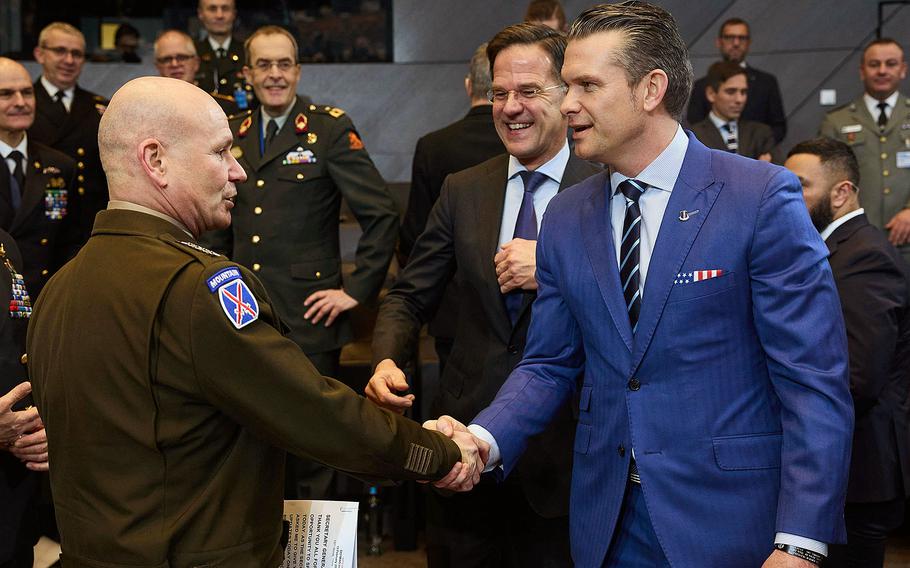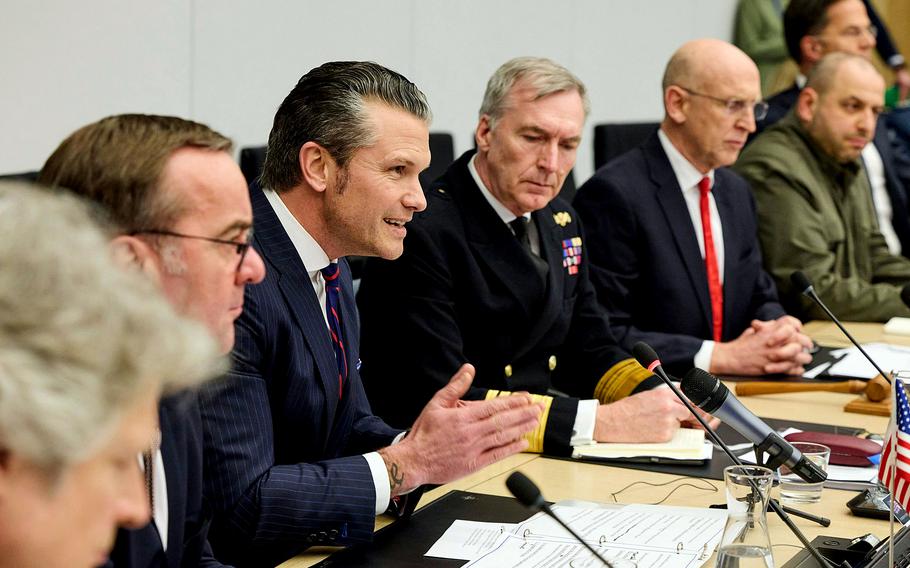
General Christopher G. Cavoli, NATO's Supreme Allied Commander Europe, shakes hands with with Defense Secretary Pete Hegseth at the meeting of the alliance's defense ministers in Brussels, Feb. 13, 2025. Behind Hegseth is NATO Secretary-General Mark Rutte. (NATO)
Defense Secretary Pete Hegseth issued a warning at NATO headquarters Thursday that falling short of White House demands for higher defense spending will put Washington’s commitment to the alliance at risk.
Hegseth, speaking at the end of a defense ministerial meeting in Brussels, said President Donald Trump would not allow a military imbalance between the United States and Europe to continue when it comes to defending the Continent.
“This administration believes deeply in alliances, but make no mistake, President Trump will not allow anyone to turn Uncle Sam into Uncle Sucker,” Hegseth said.
Trump has long argued that the failure of some NATO countries to meet defense spending commitments amounts to security freeloading.
In Brussels, Hegseth repeatedly hammered home the message of more defense spending during his NATO debut, saying that the current target of 2% of gross domestic product was no longer acceptable. He also said allies need to spend more time talking about military firepower.
“We can talk all we want about values. Values are important, but you can’t shoot values,” he said. “There is no replacement for hard power.”
Across-the-board defense spending increases are needed, given “an urgent, real threat to the Continent” from Russia, he said.
Hegseth’s comments came one day after he delivered a jolt to allies when he laid out parameters for anticipated peace talks that Trump expects to convene.
On Wednesday, Hegseth said any return to Ukraine’s prewar borders is unrealistic, as is NATO membership for Kyiv. He also said an international peacekeeping force, minus the United States, could play a role in ensuring that fighting doesn’t restart.
Such a force would function without NATO’s collective security guarantee, he said.
Hegseth’s statements that laid out conditions for formal talks amounted to a repudiation of the long-standing NATO mantra of being in it for the “long haul” with Ukraine, and that there would never be “discussions about Ukraine without Ukraine.”
The idea of demanding that Ukraine give up large swaths of its territory as part of any peace has rattled some allies, especially on NATO’s eastern flank.

U.S. Defense Secretary Pete Hegseth, third from left, speaks at a meeting of the Ukraine Defense Contact Group at NATO headquarters in Brussels, Feb. 13, 2025. (NATO)
“Today might go down in history as a dark day for Europe. It now depends on European leaders to finally recognize that we must take our fate into our own hands — right now,” said Marko Mihkelson, chair of the Estonian parliament’s foreign affairs committee, in a statement.
Estonia’s defense minister, Hanno Pevkur, appeared to take issue with Washington ruling out NATO membership and Hegseth’s statement that restoring Ukraine’s occupied territory was a nonstarter for negotiations.
“Let’s not make negotiations easy for Putin,” Pevkur said in a statement.
Kaja Kallas, the European Union’s foreign affairs chief, also said Europe should play a central role in any negotiation.
“Ukraine’s independence and territorial integrity are unconditional,” she said in a statement. “Our priority must now be strengthening Ukraine and providing robust security guarantees.”
Russia has occupied Ukrainian land roughly equal in total size to the state of Pennsylvania. Hegseth on Wednesday was asked whether the new dynamic being pushed by the White House should be interpreted as a betrayal of Ukraine.
“There is no betrayal there,” Hegseth said. “There is a recognition that the whole world and the United States is invested and interested in peace, a negotiated peace. As President Trump has said, stopping the killing.”
Any agreement between the two countries “will require both sides recognizing things they don’t want to,” he said.
Hegseth also has delivered a blunt message to NATO allies, saying that European militaries will be expected to carry most of the security burden on the Continent given U.S. commitments elsewhere.
While the U.S. will remain “an active part of this alliance,” NATO countries will need to spend significantly more to fill the defense gaps, he said.
Trump has called on members to increase their minimum spending levels to 5% of GDP.
A key question that remains unanswered is how soon allies are expected to field ground forces capable of deterring potential Russian aggression without a major contribution from the U.S. military.
Earlier this week, Hegseth said it was too soon to say whether troops in Europe would be withdrawn. But the expectation is that a larger U.S. focus in the Pacific will eventually have implications for the American military mission in Europe.
Secretary-General Mark Rutte said Thursday that the situation means allies need to ramp up fast. Russia, which has shifted to a wartime economy, is churning out more ammunition in three months than all of NATO’s European members do in a year, he said.
And a new report issued Wednesday by the International Institute for Strategic Studies said Russian military spending outpaces all of Europe put together when Russia’s lower production costs are factored in.
The IISS analysis found that Russia’s total military expenditure grew by 42% in 2024 to an estimated $145.9 billion, compared with Europe’s collective $457 billion.
However, when purchasing power parity was taken into consideration, Russia’s total adds up to the equivalent of $462 billion, IISS said.
Rutte has warned that if allied spending remains at current levels, security on the Continent will be put in danger given the scale of Russia’s military investments.
“We need to ramp up defense spending because it is clear that the U.S. rightly requires us to do more here on the European side and the Canadian side of NATO,” Rutte said Thursday.
Rutte said he expected minsters to return home from the Brussels meeting “with an even greater sense of urgency.”